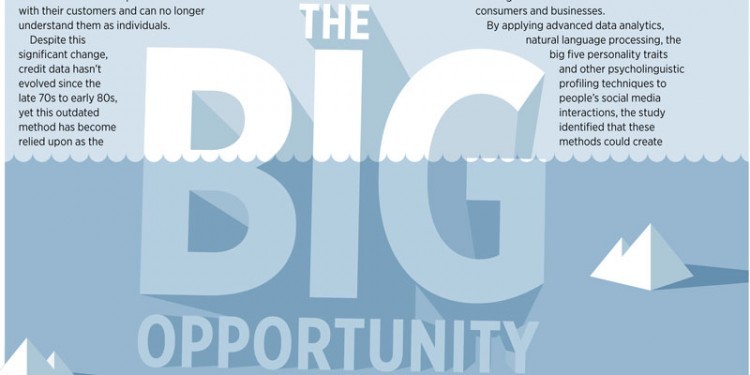Current credit scoring methods used in financial services are out of date and not fit for purpose. The intelligent use of big data will revolutionise lending decisions for banks and their customers, argues James Blake.
Thin credit files have long been a problem for financial institutions. Traditional credit scoring methods rate the lack of a consumer’s credit history as high risk – even though they may be more responsible and reliable. The problem is that credit scoring techniques are becoming increasingly archaic and are leaving banks unable to service both existing and potential customers.
HOW IT USED TO BE
Years ago, banks used to be personal. Bank managers would have a direct relationship with their customers and be able to treat each one as an individual. At this stage, credit reports would inform decisions as part of a wider assessment process.
However, today, the way banks interact with their customers has totally changed. We no longer do business face to face; everything is through apps or the internet, which means that companies lose touch with their customers and can no longer understand them as individuals.
Despite this significant change, credit data hasn’t evolved since the late 70s to early 80s, yet this outdated method has become relied upon as the foundations for modern credit decisions. Ahead of founding Hello Soda, I worked for a credit firm. Time and time again I saw people being given loans that they should not have been granted while other people were being rejected for loans that they needed and should have had. This wasn’t because businesses were trying to be unreasonable but because necessary information (our likes, dislikes, spending habits etc) was not available through traditional data bureaus, demonstrating the shortcomings of relying on these credit reports.
THE GROWTH OF BIG DATA
Around the world, consumers are creating data every single minute of the day. And the amount is growing exponentially. About a third of this data is potentially incredibly useful – giving us insights that can change the way organisations operate – but only 0.5% of it is analysed. Looking to the future, the amount of data stored is predicted to grow 50 times over by 2020. Mining this data can extract nuggets of information to discover meaningful patterns and enables us to answer questions we’ve never been able to attempt before.
With more and more data being created, it is only logical to use it to better understand consumer behaviour and to inform better, more robust financial decisions based on real insights.
WHAT CAN BIG DATA TELL US?
At Hello Soda, we’ve just published a new study in partnership with Visa Europe Collab which explores the power of social media profiling and its potential for financial services. The research reveals how online social footprints can be used to boost financial inclusion, detect fraud, enhance contactless and e-commerce and enable more targeted marketing – all on a consentonly basis. The results demonstrated that utilising social media data can benefit both consumers and businesses.
By applying advanced data analytics, natural language processing, the big five personality traits and other psycholinguistic profiling techniques to people’s social media interactions, the study identified that these methods could create a new, effective way to verify consumer identity and widen access to financial products. What’s more, with the increase in available data, and new and innovative software products available, banks can get personal again.
COMBATTING FRAUD
The research also highlighted the possibility of preventing fraudulent financial transactions before they take place. For banks and e-commerce merchants the challenge is to accept as
many good payments as possible while avoiding fraudulent ones. And with the use of social identity verification it’s possible they can authenticate transactions more accurately and enhance their existing fraud detection capabilities by tapping into social data.
GETTING PERSONAL
The integration of data and analytics technology could enable this personalisation by presenting each customer with a bespoke customer experience, facilitated by determining their wants, needs, and lifestyle, and delivering information, products and services that they are likely to consider relevant and interesting.
On one hand, an ‘unexpected’ transaction made abroad won’t be so unexpected when you have already been notified that this consumer has been planning a trip to Australia with their friends, eliminating the embarrassment and inconvenience of a blocked bank card. Likewise, a simple ‘congratulations’ at the top of a marketing email when they have just received a
promotion or got married could personalise the bank-to-consumer relationship in a way that promotes customer loyalty.
Moving into the digital age doesn’t just mean creating an app and introducing internet banking, it also requires banks to utilise the digital footprints of their consumers. The data is out there, and it’s time to start using it. Make banking personal again.
ONLY THE BEGINNING
The FinTech revolution is creating opportunities for the industry to innovate and take major steps forward when it comes to financial inclusion, ID verification, tackling fraud, debt management and more accurately targeting consumers with personalised offers instead of bombarding them with irrelevant ones.
We are making ground-breaking discoveries each and every day through big data analytics and what’s exciting is that, as an industry, we’re only just scratching the surface. Big data has farreaching possibilities in its ability to positively impact both the consumer and businesses.
To download the PDF version of the article, please use the download button at the top of this page.

